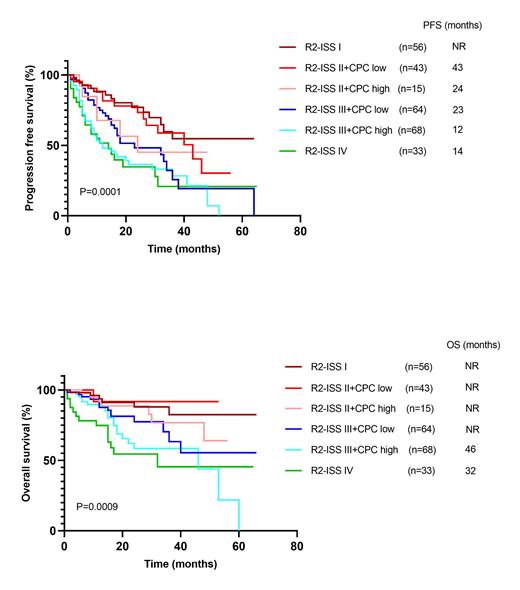Previous studies identified the prognostic significance of quantifying circulating plasma cells (CPCs) by multiparametric flow cytometry (MFC) in newly diagnosed multiple myeloma (NDMM) patients. Recently it was reported that the R2-ISS stage is a simple prognostic staging system allowing a better stratification of patients with intermediate-risk NDMM.
We evaluated if a similar quantification of CPCs could add prognostic value to the R2-ISS classification of 279 consecutive NDMM patients treated in our center from 2017 to 2022. Those patients with R2-ISS stage II and stage III disease were re-classified according to the CPCs numbers ≥0.05% (CPC high) or<0.05% (CPC low) for the purposes of this study.
The median progression free survival (PFS) for patients were as follows: not reached (R2-ISS I), 43 months (R2-ISS II with CPC low),24 months(R2-ISS II with CPC high), 23 months (R2-ISS III with CPC low),12 months (R2-ISS III with CPC high) and 14 months (R2-ISS IV). The median overall survival (OS) for patients were as follows: not reached (R2-ISS I, R2-ISS II with CPC low, R2-ISS II with CPC high and R2-ISS III with CPC low) , 46 months (R2-ISS III with CPC high) and 32 months (R2-ISS IV).
Finally, ≥ 0.05% CPCs retained its adverse prognostic significance in a multivariable model for PFS and OS. Hence, quantifying CPCs by MFC can potentially enhance the R2-ISS classification of a subset of NDMM patients with stage II and III disease by identifying those patients with a worse than expected survival outcome.
Disclosures
No relevant conflicts of interest to declare.


This feature is available to Subscribers Only
Sign In or Create an Account Close Modal